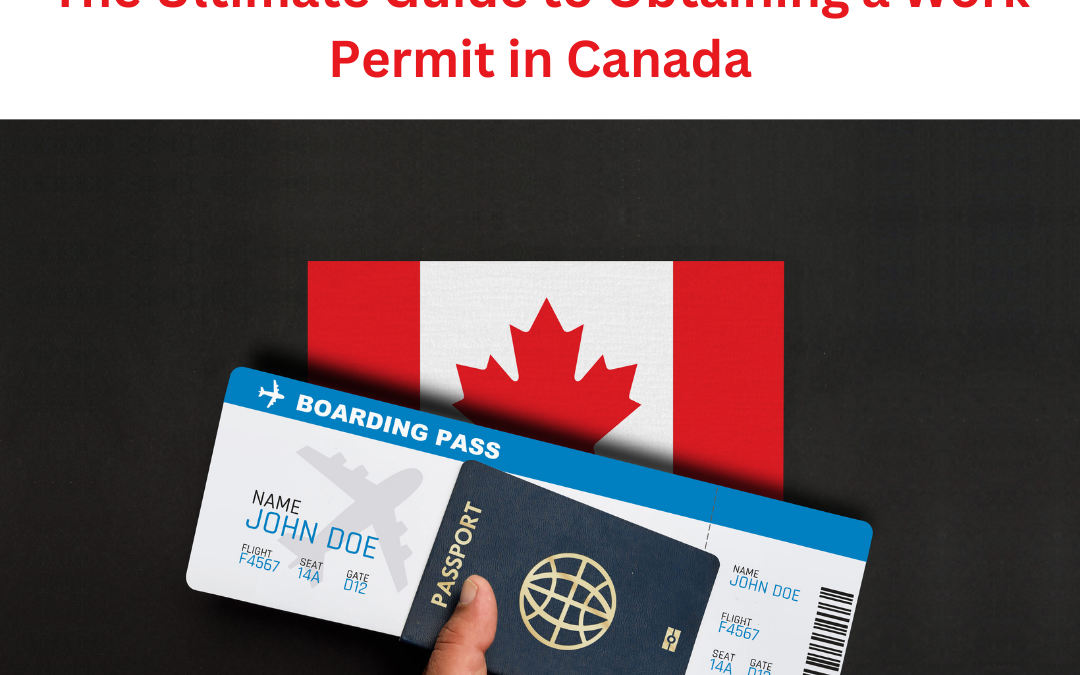Introduction:
Welcome to the ultimate guide for obtaining a work permit in Canada! If you’re dreaming of starting a new chapter of your life in the Great White North, this comprehensive guide will equip you with all the essential information you need. From application processes to eligibility criteria, we’ve got you covered. So, grab a cup of coffee and let’s dive in!
Understanding Canadian Work Permits
Canada offers various work permit options that cater to different circumstances and categories of applicants. Let’s explore the key work permit categories:
- Temporary Foreign Worker Program (TFWP):
- Designed for individuals seeking employment in Canada for a specific period.
- Requires a valid job offer from a Canadian employer.
- Employers must obtain a positive Labor Market Impact Assessment (LMIA) in most cases.
- International Mobility Program (IMP):
- Covers work permit categories exempt from the LMIA requirement.
- Includes categories such as intra-company transferees, international agreements, and more.
- Provides flexibility for certain skilled workers and individuals with unique qualifications.
Eligibility Criteria for Work Permits
Before diving into the application process, let’s discuss the general eligibility criteria for work permits in Canada:
- Job Offer:
- You must have a valid job offer from a Canadian employer.
- The job offer should comply with specific requirements set by the Canadian government.
- The employer may need to fulfill certain obligations, such as obtaining an LMIA.
- Proof of Qualifications:
- You should possess the necessary qualifications and skills for the job.
- Provide supporting documents, such as educational certificates and work experience letters.
The Application Process
Now that you understand the basics, it’s time to learn how to navigate the work permit application process effectively:
- Gather Required Documents:
- Valid passport and travel documents.
- Job offer letter from a Canadian employer.
- Educational certificates and transcripts.
- Proof of work experience.
- Language proficiency test results (e.g., IELTS, TOEFL).
- Submitting the Application:
- Depending on your country of residence, you may need to apply online or at a visa application center (VAC).
- Pay the necessary fees and provide biometric information if required.
- Double-check that all the documents are complete and accurate.
Processing Times and Work Permit Duration
It’s essential to have realistic expectations regarding processing times and the duration of your work permit. Here’s what you need to know:
- Processing Times:
- Work permit processing times can vary depending on various factors, including the type of work permit and the workload of immigration authorities.
- Check the official government website or consult with an immigration professional to get an idea of current processing times.
- Work Permit Duration:
- The duration of your work permit depends on various factors, including the type of work permit and the job offer.
- Some work permits may be issued for a specific period, while others may be open-ended.
Extending Your Work Permit
If you wish to extend your stay and continue working in Canada, you’ll need to apply for a work permit extension. Here’s what you should know:
- Eligibility for Extension:
- Ensure you still meet the eligibility criteria for a work permit extension.
- Your job offer should remain valid and comply with the requirements.
- Application Process:
- Submit the application for a work permit extension before your current permit expires.
- Include all the necessary documents, such as a new job offer letter, updated LMIA (if applicable), and updated personal information.
Bridging Open Work Permit
The Bridging Open Work Permit allows certain individuals to maintain their status while transitioning between two permits. Here’s an overview:
- Eligibility:
- You must be in Canada with a valid temporary resident status.
- Waiting for a decision on your permanent residence application or be eligible for a new work permit.
- Benefits and Application:
- The Bridging Open Work Permit enables you to continue working while waiting for your permanent residence application.
- Consult with an immigration professional to determine your eligibility and to assist with the application process.
Work Permit vs. Permanent Residency
Understanding the distinction between a work permit and permanent residency is crucial. Here’s a quick comparison:
- Work Permit:
- Provides temporary authorization to work in Canada.
- Tied to a specific job offer and employer.
- Requires periodic renewal.
- Permanent Residency:
- Grants the right to live and work in Canada indefinitely.
- Offers access to social benefits and healthcare.
- Requires meeting specific eligibility criteria and going through the immigration process.
Seek Professional Guidance
Navigating the complex world of work permits in Canada can be overwhelming. Consider seeking guidance from experienced immigration professionals, such as CMC Immigration, who can provide personalized advice and support.
Conclusion:
Congratulations! You’ve reached the end of our ultimate guide to obtaining a work permit in Canada, brought to you by CMC Immigration. We hope this comprehensive guide has provided you with the necessary knowledge and insights to navigate the complexities of the Canadian work permit system successfully.
Remember, CMC Immigration is here to support you throughout your journey. Whether you need assistance with understanding eligibility criteria, preparing your application, or seeking guidance on work permit extensions, our experienced team is ready to help. With our expertise and commitment to client satisfaction, we strive to make your immigration process smooth and hassle-free.
So, take the first step towards your Canadian dream with CMC Immigration by your side. Unlock exciting job opportunities, explore new horizons, and embark on a fulfilling professional journey in Canada. We wish you the best of luck and look forward to assisting you in your immigration endeavors.

